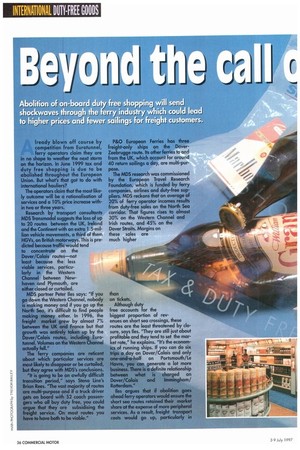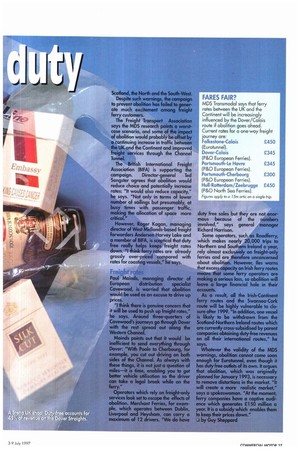Abolition of on-board duty free shopping will send shockwaves through
Page 38

Page 39

If you've noticed an error in this article please click here to report it so we can fix it.
the ferry industry which could lead to higher prices and fewer sai • gs or freight customers.
lready blown off course by competition from Eurotunnel, ferry operators claim they are in no shape to weather the next storm on the horizon. In June 1999 tax and
0 duty free shopping is due to be abolished throughout the European Union. But what's that got to do with international hauliers?
The operators claim that the most likely outcome will be a rationalisation of services and a 100/a price increase within two or three years.
Research by transport consultants MDS Transmodal suggests the loss of up to 20 routes between the UK, Ireland and the Continent with an extra 1.5-million vehicle movements, a third of them HGVs, on British motorways. This is predicted because traffic would tend to concentrate on the Dover/Calais routes—not least because the less viable services, particu larly in the Western Channel between Newhaven and Plymouth, are either closed or curtailed.
MDS partner Peter Iles says: "If you go down the Western Channel, nobody is making money and if you go up the North Sea, it's difficult to find people making money either. In 1996, the freight market grew by almost 7% between the UK and France but that growth was entirely taken up by the Dover/Calais routes, including Eurotunnel. Volumes on the Western Channel actually fell."
The ferry companies are reticent about which particular services are
. most likely to disappear or be curtailed, but they agree with MDS's conclusions.
"It is going to be an awfully difficult
' transition period," says Steno Line's Brian Rees. "The vast majority of routes are multi-purpose and if a truck driver gets on board with 52 coach passengers who all buy duty free, you could argue that they are subsidising the freight service. On most routes you have to have both to be viable."
P&O European Ferries has three freight-only ships on the DoverZeebrugge route. Its other ferries to and from the UK, which account for around 40 return sailings a day, are multi-purpose. The MDS research was commissioned by the European Travel Research Foundation, which is funded by ferry companies, airlines and duty-free suppliers. MDS reckons that an average of 20% of ferry operator incomes results from duty-free sales on the North Sea corridor. That figures rises to almost 30% on the Western Channel and Irish routes, and 45% on the Dover Straits. Margins on these sales are much higher than on tickets.
Although duty free accounts for the biggest proportion of rev enues on short sea crossings, these routes are the least threatened by closure, says Iles. "They are still just about profitable and they tend to set the market rate," he explains. "It's the economics of running ships. If you can do six trips a day on Dover/Calais and only one-and-a-half on Portsmouth/Le Havre, you can generate a lot more business. There is a definite relationship between what is charged on Dover/Calais and Immingham/ Rotterdam."
lies argues that if abolition goes ahead ferry operators would ensure the short sea routes retained their market share at the expense of more peripheral services. As a result, freight transport costs would go up, particularly in Scotland, the North and the South-Wes Despite such warnings, the campaign to prevent abolition has failed to generate much excitement among freight ferry customers.
The Freight Transport Associati says the MDS research paints a wors case scenario, and some of the impact of abolition would probably be offset by a continuing increase in traffic between the UK and the Continent and improved freight services through the Channel Tunnel.
The British International Freight Association (BIFA) is supporting the campaign. Director-general Ted Sangster agrees that abolition would reduce choice and potentially increase rates: "It would also reduce capacity," he says. "Not only in terms of lower number of sailings but presumably, at busy times with passenger traffic, making the allocation of space more critical."
However, Roger Kagan, managing director of West Midlands-based freight forwarders Andersen Harvey Lake and a member of BIFA, is sceptical that duty free really helps keeps freight rates clown. "I think ferry rates are already grossly over-priced compared with rates for coasting vessels," he says.
Paul Mainds, managing director of European distribution specialist Cavewood, is worried that abolition would be used as an excuse to drive up prices.
"I think there is genuine concern that it will be used to push up freight rates," he says. Around three-quarters of Cavewood's journeys go through Dover with the rest spread out along the Western Channel.
Mainds points out that it would be inefficient to send everything through Dover: "With Poole to Cherbourg, for example, you cut out driving on both sides of the Channel. As always with these things, it is not just a question of miles—it is time, enabling you to get better vehicle utilisation so the driver can take a legal break while on the ferry."
Operators which rely on freight-only services look set to escape the effects of abolition. Merchant Ferries, for example, which operates between Dublin, Liverpool and Heysham, can carry a maximum of 12 drivers. "We do hove duty free sales but they are not enormous because of the numbers involved," says general manager Richard Harrison.
Some operators, such as Roadferry, which makes nearly 20,000 trips to Northern and Southern Ireland a year, rely almost exclusively on freight-only ferries and are there ore unconcerned about abolition. However, Iles warns that excess capacity on Irish ferry routes means that some ferry operators are making a serious loss, so abolition will leave a large financial hole in their accounts.
As a result, all the Irish-Continent ferry routes and the Swansea-Cork route will be highly vulnerable to closure after 1999. "In addition, one vessel is likely to be withdrawn from the Scotland-Northern Ireland routes which are currently cross-subsidised by parent companies obtaining duty-free revenues on all their international routes," he says.
Whatever the validity of the MDS warnings, abolition cannot come soon enough for Eurotunnel, even though it has duty free outlets of its own. It argues that abolition, which was originally planned for January 1993, is necessary to remove distortions in the market. "It will create a more realistic market," says a spokeswoman. "At the moment, ferry companies have a captive audience which generates £150 million a year. It is a subsidy which enables them to keep their prices down."
J by Guy Sheppard








































































































